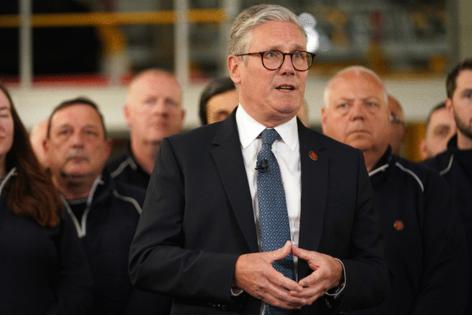UK shifts to war footing with 'always-on' munitions production
Published in News & Features
The U.K. will create an “always-on” munitions production capacity to allow it to scale-up its defense industry when needed, as it increasingly shifts to a war footing with Russia’s assault on Ukraine showing little sign of ending.
Prime Minister Keir Starmer’s government will invest £1.5 billion ($2 billion) to build six munitions factories, designed to bolster its defense industry and stockpile weapons to meet greater demand, the Ministry of Defense said. The review will also focus on the UK’s “warfighting readiness” designed to deter enemies.
The move comes ahead of the publication of a new defense strategy on Monday that’ll set out the biggest threats Britain faces and whether it has the resources to meet them.
The U.K.’s ordnance stockpiles have run dry following decades of under-investment as well as the recent support for Ukraine. While it does manufacture much of its own munitions, a decision by the last Labour government meant that it outsourced its explosives manufacturing to the likes of the U.S. and France.
The U.K., is in part, addressing its chronic reluctance to invest in its own defense industry for decades, which has seen the size of its own army fall to its smallest since the Napoleonic era. It recently announced that the new strategy will “end the hollowing out” of the U.K. armed forces, which loses as many as 300 personnel a month, by investing an additional £1.5 billion to improve military accommodation.
“We are strengthening the U.K.’s industrial base to better deter our adversaries and make the U.K. secure at home and strong abroad,” John Healey, the Defense Secretary, said.
The Ministry of Defense declined to say which defense companies would build the new factories.
The additional funding, which will take the U.K.’s munitions spend to £6 billion over the next four years, will create more than 1,000 new jobs and help the armed forces endure prolonged campaigns and support them in warfare, the ministry said.
The government has also promised to invest more than £1 billion to establish a ‘Digital Targeting Web’ to better connect Britain’s weapons systems and speed-up decisions for targeting enemy threats on the battlefield.
The review, to be published Monday, is also in response to U.S. President Donald Trump’s demand that Europe take more responsibility for its own security, and the increasing military and cyber threats against the UK.
Just weeks after Trump came into office, Starmer announced that the U.K. would increase defense spending from 2.3% to 2.5% by 2027, with a further rise to 3% in the next parliament, to bolster its military capabilities.
U.K. defense chiefs have privately warned the government that plans to raise military funding to 2.5% of economic output won’t be enough and cuts will still need to be made as a result of the underfunding. Starmer’s office and the Treasury were told earlier this year that the 0.2% increase will merely allow the U.K. to stand still and maintain current capabilities, Bloomberg reported in February.
Despite the significance of the review, Starmer’s administration is likely to come under pressure to increase its spending on defense even further as Europe and NATO look to up investment at its June summit.
That target is set to be 5% of economic output, with 3.5% on hard defense spending, and 1.5% on military-related expenditures like cyber and border security by 2032.
©2025 Bloomberg L.P. Visit bloomberg.com. Distributed by Tribune Content Agency, LLC.







Comments